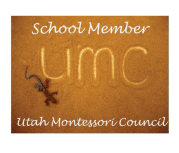Quick Links
- Carson Smith Opportunity Scholarship Information
- 2025-26 Integrated Services Description and Fees
- 2025-26 Integrated Services Annual Disclosure
- Private Provider Contract
- Approved Provider List
Have a question regarding Integrated Services? Ask it with this LINK or with a QR Code!
May Newsletter
Dear Parents,
Maria Montessori said that “Play is the work of the child.” I love to learn and teach about play because there are so many skills that are embedded in play. Additionally, I believe that as adults, we don’t play enough. 😁As summer begins, we hope you find time to relax and enjoy your children. Along with rest and play, summer is also a great opportunity to continue building important social and emotional skills at home. One simple focus is sharing—a concept that may need to be explicitly taught, modeled, and reinforced, especially for our students with disabilities.
Children benefit from learning that sharing isn’t just one thing—it can take many forms. You can support this learning by labeling and practicing different types of sharing at home:
- Using toys together (e.g., a jump rope or ball)
- Dividing items (e.g., splitting up playdough)
- Taking turns (e.g., one shovel in the sandbox)
- Trading (e.g., swapping a toy with a friend)
We’re including a visual poster to help reinforce these ideas. Consider placing it somewhere visible, like the fridge or near your kitchen table, so it serves as a daily reminder.
Here are a few simple ways to support your child:
- Observe your child during play and comment on the sharing strategy they’re using (e.g., “I noticed you and your sister were taking turns with the shovel—that’s great sharing!”).
- If a conflict arises, help your child identify whether it’s a “Mousey” (small) or “Elephant” (big) problem, then refer back to the sharing strategies to guide a solution.
- Use consistent vocabulary. If we use “take turns” at school and you use “share” at home, it may be confusing—especially for students with language support needs. Consistency helps reinforce learning across environments.
These everyday moments help strengthen the cooperation and empathy we nurture in the classroom all year long. We’re incredibly proud of the progress our students have made and look forward to building on that growth next year.
Warmly,
The Integrated Services Team
SPED MINUTE
Dear Carson Smith Opportunity Scholarship families,
As we near the end of the 2024–2025 program year, we want to share some important updates and reminders to help you prepare for the upcoming 2025–2026 school year.
🎓 Applications & Awards
The deadline to submit applications is April 30, 2025. (Applications are taken throughout the year, but the likelihood of being funded is less.)
Children’s First Education Fund (CFEF) are currently reviewing and awarding scholarships for returning students. Please make sure your application is complete—incomplete submissions may delay the process.
🎯 Awarding Process
CFEF has about 370 new scholarships to award this year.
They will start with students on the priority waitlist (those who did not receive a scholarship last year and applied by March 10).
After that, awards will be based on when applications were submitted.
Their goal is to finish awarding by the end of May, though some may extend into June.
🔄 Legacy Carson Smith Transfers
If your child is currently on a Legacy Carson Smith Scholarship and you’d like to transfer to the CSOS program, you must:
- Submit a new student application
- Answer “yes” to the Legacy CS student question
- Submit all required documentation
You must also return your intent to reenroll in the legacy program to maintain eligibility during the transition.
Transfer applications for Quarter 1 are due by August 15, 2025.
Informational materials will be shared soon.
🎉 Meet & Greet Event – May 9, 2025
Join us for our annual family event!
📍 The Gathering Place at This is the Place Heritage Park
🕔 5–7 PM
🎟️ Discounted park tickets for earlier in the day are available here.
🍕 Enjoy food trucks like Squatch Pizza, Fry Me To The Moon, and Kona Shaved Ice.
💙 Thank You
We are so grateful for your continued support and partnership. Your engagement helps make educational choice possible for Utah families.
Please reach out with any questions—we’re here to help!Warmly,
Lindsay Baird and Brittany Donaldson
1/31/25
As we have worked on increasing student independent skills, our Interventionists were able to visit the ASSERT Preschool on the Utah State University campus. We observed practitioners providing Discrete Trial Training (DTT*) instruction and implementing Activity Schedules. Activity Schedules have been well researched by Dr. Tom Higbee at Utah State. Activity schedules look like a small three ring binder. Each page has an activity on it that the student has been explicitly taught using no to limited language. This practice goes hand in hand with Montessori works. The student is required to get the work off of the shelf, complete it, and then put it back on the shelf. Some of our Interventionists are implementing these with great success! If you are interested in learning more about Activity Schedules, here is a handout from Dr. Tom Higbee.
*DTT is a structured ABA technique that breaks down skills into small, “discrete” components. Systematically, the trainer teaches these skills one by one. Along the way, trainers use tangible reinforcements for desired behavior.
1/17/2025
When I was an Early Childhood Teacher, I remember a particular moment when a parent came into my classroom and asked, “Why are you teaching my child the letter ‘A’? They already know their alphabet!” I responded by explaining the many skills embedded in the instruction of something as simple as the letter “A.”
For one, there were fine motor skills involved when they opened their pencil box and practiced writing the letter. There were social skills as well, as children worked side by side with a peer, learning to focus and sustain attention in a group setting. And, of course, there were communication skills—kids needed to ask for materials from both familiar and unfamiliar adults, and even their peers.
Over time, I started noticing a trend. Caregivers—parents, siblings, teachers—were often stepping in to complete daily tasks for children. Although they had the best of intentions, whether to avoid a struggle or to move the day along faster, they inadvertently took away valuable opportunities for children to practice essential skills. Without realizing it, they were removing chances for kids to work on speech, language, fine and gross motor skills, and even basic academic abilities.
At the beginning of this school year, I asked the Interventionists to focus on helping students become more independent. They worked to identify how much support each child needed and provided just enough to help them succeed on their own.
I’d like to challenge you to think about the small moments in your child’s day where they could practice a skill. Whether it’s learning to tie their shoes, asking for help, or even writing their name, these moments of practice matter.
P.S. That parent, who initially questioned my approach, ended up becoming one of my biggest supporters and close friends!
1/10/25
Dear Parents,
I wanted to give you an update to some of the things that have been happening with the Integrated Services program. We hired Brittany Donaldson as the Assistant SPED Director. Brittany has a wealth of knowledge in literacy, tiers of instruction, and instructional coaching. I am excited to have her so that we have more support for students and teachers. We also hired Becky Knowles to assist with standardized assessments and Student Success Plans (SSP) at the Secondary Campus. This has been a big job for me and has taken a lot of my time. Becky will be a huge support! It is our intention that every secondary student leaves with a well written and holistic plan to provide to their next school so they are supported from Day 1.
Next, I have heard the questions asked, “What is Integrated Services? What am I paying for? What type of student do these services serve?”
Integrated Services provides explicit instruction and/or accommodations on skill deficits for students who have been identified as having a disability. “Explicit instruction” is instruction providing one clearly defined skill, with explicit and clear language, and scaffolding support. The instruction begins with teacher demonstration (I Do), followed by supported practice (We do), then independent practice (You Do). This instruction is provided by our Interventionists and Therapists. Additionally, the classroom environment and Montessori trained staff provide models and practice opportunities to help the student generalize skills to be able to independently engage and progress in the general curriculum.
Integrated Service fees are required for students who have been identified as having a disability AND the disability impacts their education or the education of others. The fee helps to pay the salaries of our Integrated Services staff (Interventionists and Therapists). The Integrated Service fee covers one-third of the total cost, while the Sorenson Legacy Foundation subsidizes the remaining two-thirds.
Characteristics of a student with a disability who thrives at Elizabeth Academy may have low cognitive function and mild/moderate adaptive skills. These students progress with minimal prompting (i.e. visual, verbal, or modeling) when completing activities of daily living. These students are aware of their surroundings allowing them to benefit from their peer models.
I plan to continually add to the weekly email that the Administration sends out, so be on the lookout!
Sincerely,
Lindsay Baird
SPED Director





